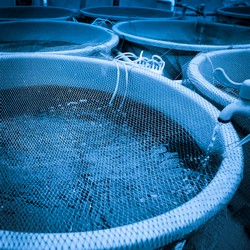Ozone cleaning in aquaculture industry
Ozone represents an easy and effective solution for breaking down particulate matter in recirculation aquaculture systems (RASs), but its use in RASs is limited. This is due to a lack of scientific knowledge on how ozone works, especially in seawater, in removing and dissolving particulate matter, as well as a lack of standardised equipment. Funded by the EU, the RAZONE(opens in new window) (Development of sustainable and cost effective water quality management technology for the aquaculture industry) project worked to develop ozone technology for improved water quality in RASs that is cost efficient and safe for stock animals. The project brought together four small and medium-sized enterprises, three research and technology development performers, and three large end users. An initial review of the literature on ozone technology revealed methods of controlling the size of ozone microbubbles, the most important parameter. Researchers also showed that ozonation of fresh water and seawater resulted in different minerals being removed from the system, improving the water quality. The technology will allow farmers to increase the number of animals in a system without increasing health risks and also redress the current limitations of ozone technology in the aquaculture sector. This can be achieved through the development of an improved ozone delivery and dispersion technique, floc separation and control of the ozonation process. A novel ozone delivery system was developed in order to maximise the efficiency of ozone dispersion in effluent water. Two identical systems were used during trials, an ozonated and a non-ozonated one. They demonstrated that there were no significant differences or abnormal impact on fish behaviour or health. RAZONE's innovative technology provides a better understanding of the impact of ozone in water chemistry and livestock, contributing to reduced footprint of devices used in RASs. It also represents an improvement in water quality management and aquaculture, which in turn will contribute to production of healthier fish in Europe and worldwide.







